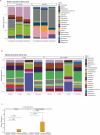Kinetics of imidazole propionate from orally delivered histidine in mice and humans
- PMID: 39496629
- PMCID: PMC11535228
- DOI: 10.1038/s41522-024-00592-8
Kinetics of imidazole propionate from orally delivered histidine in mice and humans
Abstract
Imidazole Propionate (ImP), a gut-derived metabolite from histidine, affects insulin signaling in mice and is elevated in type 2 diabetes (T2D). However, the source of histidine and the role of the gut microbiota remain unclear. We conducted an intervention study in mice and humans, comparing ImP kinetics in mice on a high-fat diet with varying histidine levels and antibiotics, and assessed ImP levels in healthy and T2D subjects with histidine supplementation. Results show that dietary histidine is metabolized to ImP, with antibiotic-induced gut microbiota suppression reducing ImP levels in mice. In contrast, oral histidine supplementation resulted in increases in circulating ImP levels in humans, whereas antibiotic treatment increased ImP levels, which was associated with a bloom of several bacterial genera that have been associated with ImP production, such as Lactobacilli. Our findings highlight the gut microbiota's crucial role in regulating ImP and the complexity of translating mouse models to humans.
© 2024. The Author(s).
Conflict of interest statement
M.N. is a member of the scientific advisory board of Caelus Health and all honoraria are paid to the employer Amsterdam University Medical Centres. F.B. receives research funding from Biogaia AB, is co-founder and shareholder of Roxbiosens Inc and Implexion AB, and is on the scientific advisory board of Bactolife A/S. K.C. has held a collaborative research contract with Danone Research in the context of the MetaCardis project. D.H.v.R. has participated in advisory boards for AstraZeneca, Boehringer Ingelheim‐Eli Lilly Alliance, MSD, Novo Nordisk and Sanofi, and has received research grants from AstraZeneca, Boehringer Ingelheim‐Eli Lilly Alliance, MSD and Sanofi. All honoraria are paid to the employer of Amsterdam University Medical Centres. All other authors declare to have no related conflict of interest.
Figures






References
-
- Chakaroun, R. M., Olsson, L. M. & Backhed, F. The potential of tailoring the gut microbiome to prevent and treat cardiometabolic disease. Nat. Rev. Cardiol.20, 217–235 (2023). - PubMed
-
- Herrema, H., IJzerman, R. G. & Nieuwdorp, M. Emerging role of intestinal microbiota and microbial metabolites in metabolic control. Diabetologia60, 613–617 (2017). - PubMed
MeSH terms
Substances
Grants and funding
LinkOut - more resources
Full Text Sources
Medical

